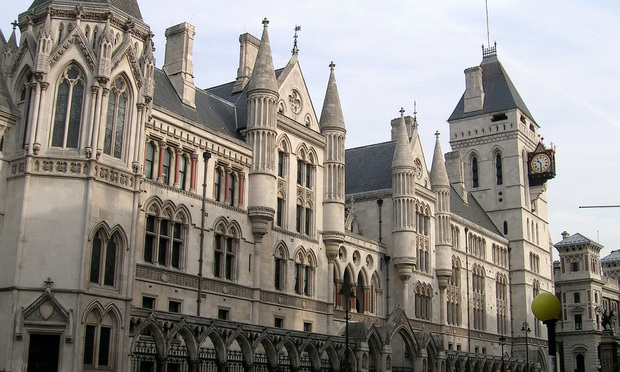Addleshaws' Barclays Relationship Criticised as it Fails to Strike Out Negligence Claim
A company claiming negligence by Addleshaws has alleged it was under 'informal control' by Barclays.
July 17, 2019 at 07:41 AM
3 minute read
The High Court has rejected an application by Addleshaw Goddard to strike out a professional negligence claim made against it.
The City firm sought to throw out a claim brought by a now-insolvent Scottish company, which accused the firm of failing to perform its duties in a case the company brought against Barclays seven years ago. The company accused Addleshaws of being influenced by the bank and suffering a conflict of interests, leaving it unable to act independently.
The original claim against Addleshaws for breach of contract and breach of fiduciary duty was brought by the claimant Arthur Holgate & Sons – a now-liquidated family business based in Scotland – which became embroiled in a dispute with Barclays in 2012.
The company alleged that the bank missold it an "interest rate hedging" product back in 2007, and subsequently sought advice from legacy HBJ Gateley – now a part of Addleshaws.
But the company alleged that Barclays had "informal control" over Addleshaws, which allowed the bank "to influence the actions and matters" related to its claim.
The judgment document details that this informal control was "expressly acknowledged in an email" between the Addleshaws partner overseeing the matter, Tim Cooper, and people at Deloitte who acted as joint administrators of the company after it became insolvent.
In its particulars of claim, the company cited Addleshaws' place on Barclays legal panel, as well as its motivation to "build and maintain a close relationship with the bank" as factors contributing to the bank's informal control over the firm.
In light of these and other factors, the company asserted that Addleshaws "would not have been able to pursue a claim against the bank without fear or favour", nor without the "requisite independence", and that it suffered a "conflict of interests" preventing it from effectively acting in the company's interests as it pursued its claim against the bank.
Addleshaws, however, attempted to get the professional negligence claim thrown out on the basis that "Scotland was the more convenient forum" and that courts in England and Wales did not have jurisdiction. It further argued that, while the case may not be time-barred in England and Wales, it may "at least in part" be time-barred in Scotland, where there is a five-year limitation period.
The High Court rejected this argument, siding with the claimant company, which asserted among other things that the place of performance of the contract was England.
Addleshaws declined to comment.
This content has been archived. It is available through our partners, LexisNexis® and Bloomberg Law.
To view this content, please continue to their sites.
Not a Lexis Subscriber?
Subscribe Now
Not a Bloomberg Law Subscriber?
Subscribe Now
NOT FOR REPRINT
© 2025 ALM Global, LLC, All Rights Reserved. Request academic re-use from www.copyright.com. All other uses, submit a request to [email protected]. For more information visit Asset & Logo Licensing.
You Might Like
View All

Deacons Hires Reed Smith’s Banking Partner in Hong Kong


Amazon Corporate Counsel in Brussels Returns to US Firm in ‘Boomerang Hire’
2 minute readTrending Stories
- 1With New Civil Jury Selection Rule, Litigants Should Carefully Weigh Waiver Risks
- 2Young Lawyers Become Old(er) Lawyers
- 3Caught In the In Between: A Legal Roadmap for the Sandwich Generation
- 4Top 10 Developments, Lessons, and Reminders of 2024
- 5Gift and Estate Tax Opportunities and Potential Traps in 2025 for Our New York High Net Worth Clients
Who Got The Work
J. Brugh Lower of Gibbons has entered an appearance for industrial equipment supplier Devco Corporation in a pending trademark infringement lawsuit. The suit, accusing the defendant of selling knock-off Graco products, was filed Dec. 18 in New Jersey District Court by Rivkin Radler on behalf of Graco Inc. and Graco Minnesota. The case, assigned to U.S. District Judge Zahid N. Quraishi, is 3:24-cv-11294, Graco Inc. et al v. Devco Corporation.
Who Got The Work
Rebecca Maller-Stein and Kent A. Yalowitz of Arnold & Porter Kaye Scholer have entered their appearances for Hanaco Venture Capital and its executives, Lior Prosor and David Frankel, in a pending securities lawsuit. The action, filed on Dec. 24 in New York Southern District Court by Zell, Aron & Co. on behalf of Goldeneye Advisors, accuses the defendants of negligently and fraudulently managing the plaintiff's $1 million investment. The case, assigned to U.S. District Judge Vernon S. Broderick, is 1:24-cv-09918, Goldeneye Advisors, LLC v. Hanaco Venture Capital, Ltd. et al.
Who Got The Work
Attorneys from A&O Shearman has stepped in as defense counsel for Toronto-Dominion Bank and other defendants in a pending securities class action. The suit, filed Dec. 11 in New York Southern District Court by Bleichmar Fonti & Auld, accuses the defendants of concealing the bank's 'pervasive' deficiencies in regards to its compliance with the Bank Secrecy Act and the quality of its anti-money laundering controls. The case, assigned to U.S. District Judge Arun Subramanian, is 1:24-cv-09445, Gonzalez v. The Toronto-Dominion Bank et al.
Who Got The Work
Crown Castle International, a Pennsylvania company providing shared communications infrastructure, has turned to Luke D. Wolf of Gordon Rees Scully Mansukhani to fend off a pending breach-of-contract lawsuit. The court action, filed Nov. 25 in Michigan Eastern District Court by Hooper Hathaway PC on behalf of The Town Residences LLC, accuses Crown Castle of failing to transfer approximately $30,000 in utility payments from T-Mobile in breach of a roof-top lease and assignment agreement. The case, assigned to U.S. District Judge Susan K. Declercq, is 2:24-cv-13131, The Town Residences LLC v. T-Mobile US, Inc. et al.
Who Got The Work
Wilfred P. Coronato and Daniel M. Schwartz of McCarter & English have stepped in as defense counsel to Electrolux Home Products Inc. in a pending product liability lawsuit. The court action, filed Nov. 26 in New York Eastern District Court by Poulos Lopiccolo PC and Nagel Rice LLP on behalf of David Stern, alleges that the defendant's refrigerators’ drawers and shelving repeatedly break and fall apart within months after purchase. The case, assigned to U.S. District Judge Joan M. Azrack, is 2:24-cv-08204, Stern v. Electrolux Home Products, Inc.
Featured Firms
Law Offices of Gary Martin Hays & Associates, P.C.
(470) 294-1674
Law Offices of Mark E. Salomone
(857) 444-6468
Smith & Hassler
(713) 739-1250









